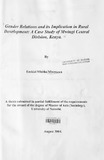| dc.description.abstract | In every human society, gender relations are an integral part of everyday life. In Kenya,
they are crucial in rural development particularly when it is observed from a human
development perspective. Based on the foregoing, the study set out to explore the
prevailing gender relations and their implication for rural development in Mwingi Central
Division, Mwingi District, Kenya. The objectives of the study were: to determine the
effect of an individual's decision-making capacity on personal access to community
resources; to find out the nature of conjugal property ownership and its relationship to
individual empowerment; and to investigate the interaction between gender-based
division of labor and individual participation in development activities. Three theoretical
frameworks guided the study.
In terms of methodology, the study employed triangulation method of social
investigation. In particular the study used three techniques of data collection: survey, key
informant interviews and focused group discussions that yielded both qualitative and
quantitative data. The quantitative data was analyzed using the computer package SPSS
while the qualitative was analyzed manually. Various sampling techniques were used:
purposive for the administrative district, division and location; and simple random for the
sub locations, villages and households. The study interviewed 130 respondents, 6 key
informants and undertook 3 focused group discussions.
The study found: glaring gender disparities in favor of men with regard to literacy
income, property ownership and decision-making; and various roadblocks with regard to
access to and use of productive community resources particularly for women safe for
credit facilities and immunization services, the latter especially for their children. From
these findings, the study concludes that: human development cannot be at par gender
wise without a policy shift in the existing gender relations; low levels of income and
literacy are as a result of a myriad of roadblocks with regard to accessing productive
community resources; and that generally development is set to remain low in the absence
of the recommended remedies.
Based on the findings and conclusions, two-fold recommendations have been put
forward. With regard to policy change, it is recommended that: comprehensive civic
education should be undertaken especially through community organization and action to
bring about community consciousness; role of micro-credit services should be
emphasized and promoted at the grass root level; and that locally available resources
should be harnessed to uplift the local people's living standards. With regard to future
research, studies with the following foci have been recommended: on areas of rural
development other than human development; rural development determinants other than
gender relations; on urban development; and those on specific social stratum. | en |

